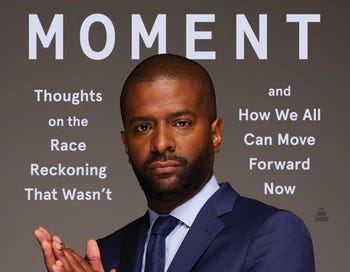The racial reckoning that wasn't
Author and former politician Bakari Sellers moves beyond merely calling for meaningful policy changes to address the ailments of Black America. He also offers specific ideas for improvement.
The Moment: Thoughts on the Race Reckoning That Wasn't and How We All Can Move Forward Now
By Bakari Sellers
One of my strong suits as a writer and local elected official is my willingness to seek out differing perspectives. I’d wager a healthy amount that no one I know, even tangentially, reads as many articles, blogs and books from authors whose political or policy viewpoints they do not share.
Bakari Sellers is in that camp. Sellers, currently a CNN political analyst, is an attorney who, in 2006 at age 22, rose to fame by winning a seat in the South Carolina House of Representatives, and in the process became the youngest Black elected official in U.S. at the time. Today, Sellers is a widely known activist for causes related to advancing Black families and communities.
I was drawn to his book, The Moment: Thoughts on the Race Reckoning That Wasn't and How We All Can Move Forward Now, after hearing him speak to Tim Miller on The Bulwark podcast. Though he shared a much less sanguine opinion about the state of the U.S. and the role it plays regarding the Black family, I did enjoy learning of his views on race, policy, politics, policing, and where we go from here.
What I found most interesting
He was hopeful that the death of George Floyd in 2020 would lead to what he calls a racial awakening, whereby the nation would undertake to address underlying issues springing from systemic racism. Instead, he says, the outrage and protests, and the corporate pledges that followed, lacked substance and depth, and failed to lead to any substantive change that would positively impact marginalized communities.
Additionally, he devotes a significant portion of The Moment to calling to task performative allyship, which he describes as individuals or institutions appearing to support racial justice but who lack genuine commitment and follow-through. The gestures include, but are not limited to, public statements or other symbolic acts, are often made to gain social approval or avoid criticism rather than to effect real, meaningful change, he says.
What I found most rewarding
The book wasn’t all doom and gloom, however. Sellers put forward a roadmap of sorts for progress. In it, he emphasizes sustained activism, policy reforms, and continued community engagement. His practical tips include showing support for Black-owned businesses, increased investment in education, and criminal justice reform.
I might not look at the country through the same prism as Sellers, but I admire his conviction to advocate for the disadvantaged, which is in his blood. His father, Cleveland Sellers, a founding member of the Student Nonviolent Coordinating Committee (SNCC), was shot by South Carolina state troopers during the Orangeburg Massacre. He survived his wounds, but three others died; the officers were found not guilty while the elder Sellers was convicted and forced to serve seven months in jail for his part in the event.
Who should read the book?
I finished the book over a weekend in May. Candidly, I didn’t know if I’d enjoy it enough to stick with it at the outset, but a few pages in, I was entertained and interested enough to finish it. I’m glad I did. You could feel the author’s passion for the topics he discusses and the remedies he proposes as fixes to some of the most vexing challenges. Even if you don’t agree with him on the how or the why, there is enough common ground on the need for positive change to make the book worthwhile. Plus, his storytelling is regaling.




